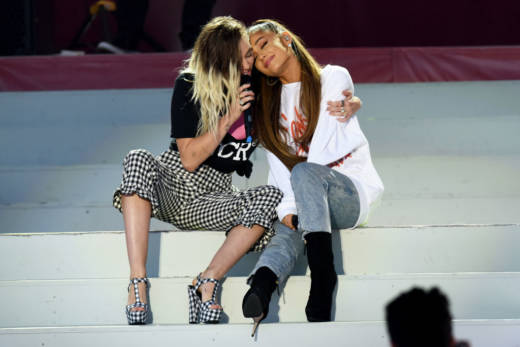Up until a few weeks ago, Ariana Grande was the most childlike of the nation's pop talent. Even amidst broad attempts to sex up her image (the "Side to Side" video even pulled off the feat of making exercise bicycles seem sexy), she's never quite been able to shake off an overwhelming air of innocence. Maybe it's the doe eyes and the ponytail; perhaps it's just been impossible for us to forget about her Nickelodeon background; but even in the midst of singing a song titled "Dangerous Woman," clad in nothing but lingerie, it's been consistently difficult to see Grande as a bonafide grown up—somebody worth taking seriously.
The media, broadly speaking, has contributed to the infantilization of Grande. At the end of 2014, Jezebel asked "Is Ariana Grande Actually a Baby?" During that same period, The New York Daily News ran a story titled "Ariana Grande demands to be carried like a baby when she's tired," and TMZ queried "Ariana Grande Gets Carried Like a Baby?" In USA Today's report on the matter, they also called her "pint-sized." Grande's habit of indulging in this particularly unusual method of backstage transportation is less note-worthy than the fact that multiple news outlets compared her to an infant because of it. If it was, say, Rihanna being lifted off her feet after a show, she would surely have been called a diva, not a baby.
There has been much speculation about why it was Grande's show in Manchester Arena that was singled out by a suicide bomber, and it's possible that her girlie image was a factor. Across the board, the conclusion reached by pretty much everyone—Rolling Stone, Ms., Slate, Salon, The Atlantic and many more—was that this was an attack specifically designed to target young girls and women. Ms. in particular noted: "Ignoring the overwhelming evidence of the Manchester Arena bombing as gender-based prevents progress from continuous oppression against women and girls alongside other marginalized groups."
It is impossible to predict how artists who experience tragedy at their shows will respond after the fact. In 2000, nine people were killed and 26 people were injured during Pearl Jam's set at the Roskilde Festival in Denmark. In the wake of the horror, the band almost broke up, wrote a song about the accident (titled "Love Boat Captain"), and said they would never play a festival ever again. In 1979, when 11 people were killed in a crush at a concert by The Who, they forged ahead with the rest of their tour, at the behest of guitarist Pete Townshend who told his bandmates, "If we don't play tomorrow, we'll never play again.”
Most recently, after 89 of their fans were murdered by terrorists at the Bataclan venue in Paris, Eagles of Death Metal found healing in returning to the city, first as special guests at a U2 concert, then at their own show for survivors of the attack, three months after it happened.


